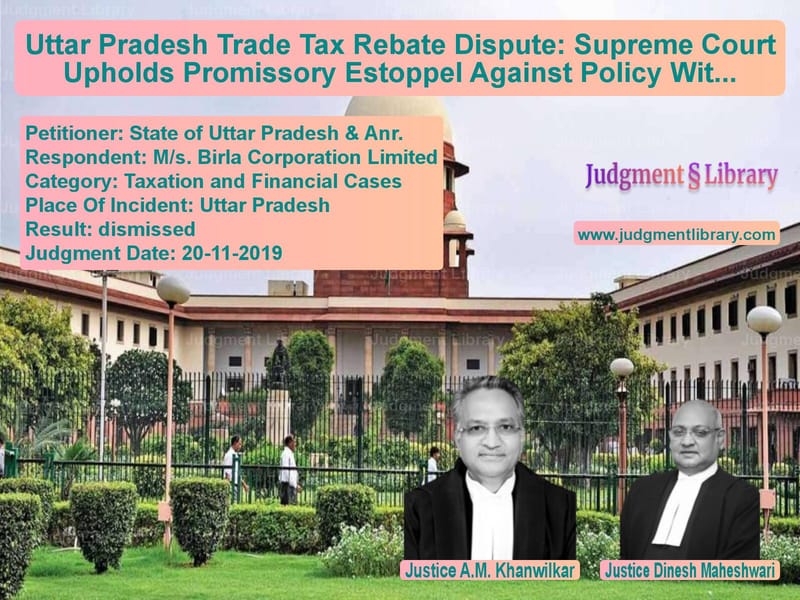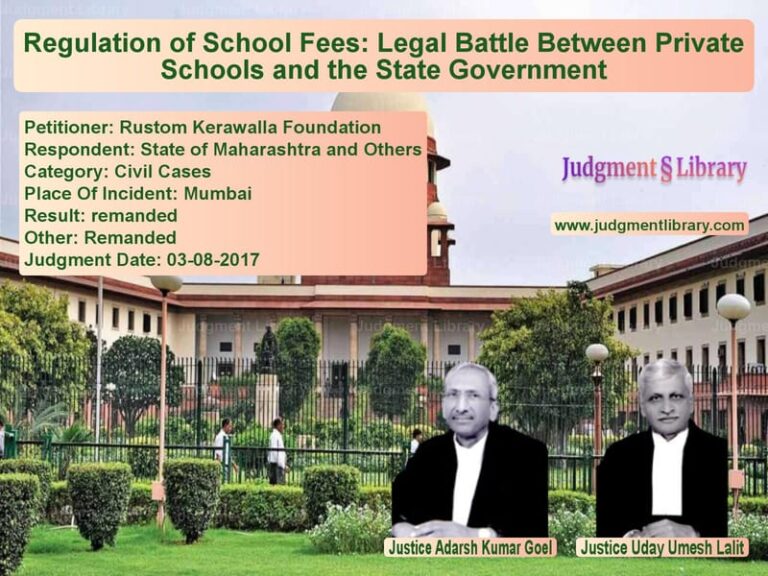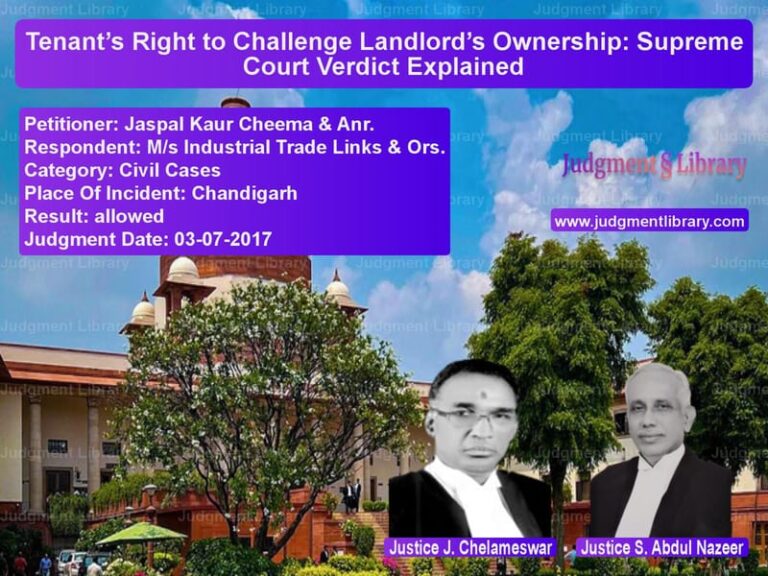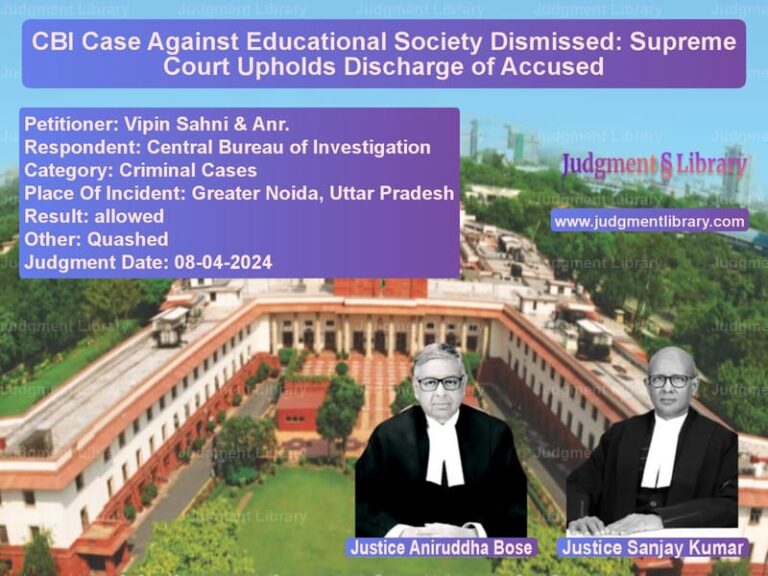Uttar Pradesh Trade Tax Rebate Dispute: Supreme Court Upholds Promissory Estoppel Against Policy Withdrawal
The legal dispute between the State of Uttar Pradesh and M/s. Birla Corporation Limited revolved around the State’s decision to rescind a tax rebate policy granted to industries under the Uttar Pradesh Trade Tax Act, 1948. The Supreme Court was called upon to determine whether the government could unilaterally withdraw tax incentives promised to industries that had already acted on them.
The key legal principle under scrutiny was promissory estoppel, which prevents a government from reneging on a policy that has induced businesses to make significant investments. The Court also examined whether the State’s financial concerns and alleged public interest considerations justified the abrupt withdrawal of tax benefits.
Background of the Case
To promote industrial growth and environmental sustainability, the Uttar Pradesh government issued a notification on February 27, 1998, offering tax rebates to industries using fly ash in their manufacturing processes. This initiative aimed to:
- Encourage the use of fly ash from thermal power plants to reduce environmental pollution.
- Attract investment in backward regions of the State by providing fiscal incentives.
- Support local industries by making fly ash-based manufacturing more financially viable.
However, on October 14, 2004, the State issued another notification withdrawing the rebate. The government cited revenue losses and the failure of the policy to achieve its objectives as justification. The affected industries, including M/s. Birla Corporation, challenged the withdrawal, arguing that they had made investments based on the 1998 promise.
Petitioner’s Arguments (State of Uttar Pradesh)
The State government contended that:
- The tax rebate failed to encourage significant industrial activity or increased consumption of fly ash.
- State revenue had been adversely affected, necessitating the withdrawal.
- It retained the right to modify or rescind tax policies under Section 5 of the Uttar Pradesh Trade Tax Act, 1948.
- Public interest considerations outweighed any commitments made under the previous policy.
- The policy change applied universally and did not target any specific industry unfairly.
Respondent’s Arguments (M/s. Birla Corporation Limited & Other Industries)
The industries countered the State’s claims, arguing:
- They had invested in setting up manufacturing units specifically based on the 1998 notification’s promise of tax rebates.
- The State’s withdrawal violated the doctrine of promissory estoppel, which prevents a government from retracting a promise that businesses relied upon.
- The tax rebate withdrawal imposed undue financial hardship on industries that had structured their operations around the policy.
- The 2004 notification should not apply retrospectively to industries that had already commenced production.
Supreme Court’s Judgment
The Supreme Court delivered a landmark judgment upholding the principle of promissory estoppel. The Court’s key findings were:
- The 1998 notification created a legitimate expectation for industries, which had acted upon it in good faith.
- The State government could not arbitrarily withdraw tax incentives once industries had made irreversible financial commitments.
- The principle of promissory estoppel applied, preventing the government from enforcing the 2004 notification retrospectively.
- The government’s justification of financial loss and administrative difficulties did not constitute supervening public interest sufficient to override promissory estoppel.
- Industries that had commenced production before the 2004 notification were entitled to continue receiving tax rebates until the originally promised period expired.
Key Observations from the Judgment
The Supreme Court made several critical observations regarding the application of promissory estoppel in tax policy:
“The notification dated 14th October, 2004, cannot be construed as having retrospective or retroactive effect to whittle down the accrued rights in favor of such industrial units.”
“It is well established that the Court is obliged to insist on a highly rigorous standard of proof in the discharge of the burden and onus upon the State to justify its action as supervening public interest.”
The Court noted that if governments were allowed to unilaterally rescind tax incentives, it would undermine investor confidence and disrupt economic planning.
Implications of the Judgment
This ruling has significant implications for both businesses and policymakers:
- Governments must carefully assess the impact of policy reversals before implementation.
- Promissory estoppel serves as a safeguard against arbitrary policy changes that could harm businesses.
- Future tax incentive programs must be structured with clear termination clauses to avoid similar disputes.
- Businesses can rely on legal protection if they suffer financial losses due to abrupt government policy changes.
Ultimately, the Supreme Court’s ruling reinforces the importance of policy stability in fostering industrial growth and maintaining investor trust.
Petitioner Name: State of Uttar Pradesh & Anr..Respondent Name: M/s. Birla Corporation Limited.Judgment By: Justice A.M. Khanwilkar, Justice Dinesh Maheshwari.Place Of Incident: Uttar Pradesh.Judgment Date: 20-11-2019.
Don’t miss out on the full details! Download the complete judgment in PDF format below and gain valuable insights instantly!
Download Judgment: State of Uttar Prade vs Ms. Birla Corporati Supreme Court of India Judgment Dated 20-11-2019.pdf
Direct Downlaod Judgment: Direct downlaod this Judgment
See all petitions in Tax Refund Disputes
See all petitions in GST Law
See all petitions in Banking Regulations
See all petitions in Judgment by A M Khanwilkar
See all petitions in Judgment by Dinesh Maheshwari
See all petitions in dismissed
See all petitions in supreme court of India judgments November 2019
See all petitions in 2019 judgments
See all posts in Taxation and Financial Cases Category
See all allowed petitions in Taxation and Financial Cases Category
See all Dismissed petitions in Taxation and Financial Cases Category
See all partially allowed petitions in Taxation and Financial Cases Category







